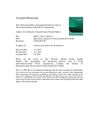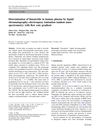 3 citations,
May 2023 in “Frontiers in immunology”
3 citations,
May 2023 in “Frontiers in immunology” Faulty inflammasome activation may lead to autoimmune skin diseases and could be a target for new treatments.
 November 2012 in “Endocrine Practice”
November 2012 in “Endocrine Practice” Enzymes called 5α-reductases have many body functions and need more research to safely use inhibitors.
 20 citations,
October 2018 in “American Journal of Clinical Dermatology”
20 citations,
October 2018 in “American Journal of Clinical Dermatology” Some drugs can cause skin and hair color changes, often reversible when the drug is stopped.
 25 citations,
October 2018 in “PloS one”
25 citations,
October 2018 in “PloS one” Key genes regulate hair follicle phase changes in Inner Mongolia cashmere goats.
 44 citations,
July 2012 in “Endocrine Practice”
44 citations,
July 2012 in “Endocrine Practice” We need to learn more about 5α-reductases and neuroactive steroids to safely make drugs targeting these enzymes.

Cornification is the process where living skin cells die to create a protective barrier, and problems with it can cause skin diseases.
1 citations,
January 2023 in “International journal of molecular sciences” Rabbits with Sarcoptes scabiei had thicker skin, cell death, and skin hardening.
 January 2024 in “bioRxiv (Cold Spring Harbor Laboratory)”
January 2024 in “bioRxiv (Cold Spring Harbor Laboratory)” A specific enzyme is essential for proper hair follicle stem cell development and healthy skin.
 28 citations,
January 2004 in “British Journal of Pharmacology”
28 citations,
January 2004 in “British Journal of Pharmacology” Minoxidil protects heart and improves recovery.
 90 citations,
October 1996 in “Dermatologic Clinics”
90 citations,
October 1996 in “Dermatologic Clinics” Growth factors are crucial for hair development and could help treat hair diseases.
6 citations,
January 2023 in “International journal of molecular sciences” Mast cells and CD8 T cells interact closely in skin diseases, affecting each other's behavior and contributing to conditions like psoriasis and eczema.
 19 citations,
July 2020 in “Journal of drug delivery science and technology”
19 citations,
July 2020 in “Journal of drug delivery science and technology” Nanoemulsions with minoxidil and clove oil effectively target hair follicles for better alopecia treatment.
 120 citations,
November 2014 in “Biological Reviews”
120 citations,
November 2014 in “Biological Reviews” The telogen phase of hair growth is active and important for preparing hair follicles for regeneration, not just a resting stage.
16 citations,
January 2010 in “Springer eBooks”  11 citations,
May 2021 in “Journal of Cosmetic Dermatology”
11 citations,
May 2021 in “Journal of Cosmetic Dermatology” Platelet-rich plasma therapy could be an effective treatment for melasma with minimal side effects.
450 citations,
January 2005 in “The journal of investigative dermatology/Journal of investigative dermatology” Hair color is determined by melanin produced and transferred in hair follicles.
 42 citations,
October 2011 in “Seminars in Cell & Developmental Biology”
42 citations,
October 2011 in “Seminars in Cell & Developmental Biology” Eph/ephrin signaling is important for skin cell behavior and could be targeted to treat skin diseases.
 39 citations,
August 2017 in “Colloids and Surfaces B: Biointerfaces”
39 citations,
August 2017 in “Colloids and Surfaces B: Biointerfaces” 50-nm nanoparticles are better at penetrating skin and targeting hair follicles for drug delivery than 100-nm ones.
 13 citations,
July 2011 in “Photomedicine and laser surgery”
13 citations,
July 2011 in “Photomedicine and laser surgery” Coloring white hair before IPL treatment effectively helps remove it.
 5 citations,
January 2015 in “Dermatology”
5 citations,
January 2015 in “Dermatology” The report suggests that the same underlying issue in blood vessel support may cause angiokeratomas on both the scrotum and eyelids.
 13 citations,
November 2010 in “Experimental Dermatology”
13 citations,
November 2010 in “Experimental Dermatology” Vitamin C derivative reduces hair loss-related protein in cells.
 71 citations,
January 2015 in “Journal of molecular cell biology/Journal of Molecular Cell Biology”
71 citations,
January 2015 in “Journal of molecular cell biology/Journal of Molecular Cell Biology” mTOR signaling helps activate hair stem cells by balancing out the suppression caused by BMP during hair growth.
 8 citations,
January 2021 in “Pharmaceutics”
8 citations,
January 2021 in “Pharmaceutics” Nanoporous silica entrapped lipid-drug complexes significantly improve the solubility and absorption of drugs that don't dissolve well in water.
 4 citations,
January 2015 in “Journal of microbial & biochemical technology”
4 citations,
January 2015 in “Journal of microbial & biochemical technology” Biotin helps regulate proteins in the blood, which may explain its role in hair growth.
 October 2024 in “Frontiers in Oncology”
October 2024 in “Frontiers in Oncology” Keratin 18 helps diagnose and predict cancer progression and affects cancer growth and spread.
 9 citations,
February 2022 in “Biomolecules”
9 citations,
February 2022 in “Biomolecules” Drinking a lot of alcohol increases the risk of prostate cancer and can worsen the condition.
 2 citations,
October 2010 in “European Journal of Drug Metabolism and Pharmacokinetics”
2 citations,
October 2010 in “European Journal of Drug Metabolism and Pharmacokinetics” Researchers developed a quick and sensitive way to measure finasteride in blood using a small sample size.
 11 citations,
August 2013 in “International Journal of Cosmetic Science”
11 citations,
August 2013 in “International Journal of Cosmetic Science” The study suggests that a new protease inhibitor can make hair harder to pull out, potentially reducing hair loss.
 February 2025 in “Stem Cell Research & Therapy”
February 2025 in “Stem Cell Research & Therapy” Maintaining healthy mitochondria may help treat hair loss.

























